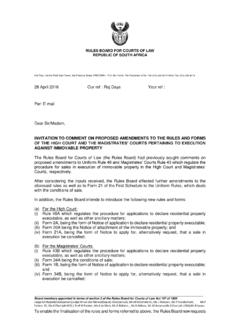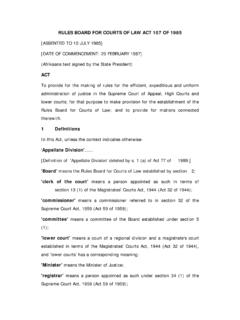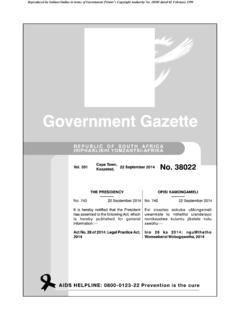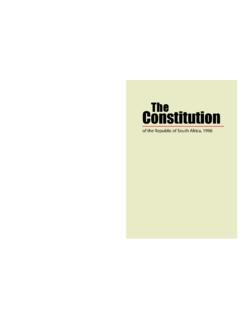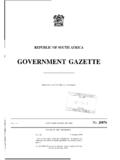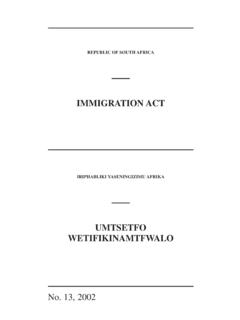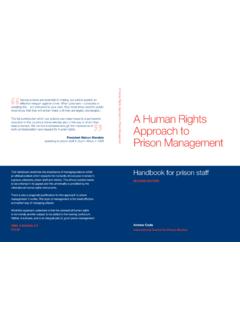Transcription of THE SUPREME COURT OF APPEAL REPUBLIC OF SOUTH …
1 THE SUPREME COURT OF APPEALREPUBLIC OF SOUTH africa JUDGMENTCase No 385/2009In the matter between:MOSEME ROAD CONSTRUCTION CC First AppellantLONEROCK CONSTRUCTION (PTY) LTD Second AppellantTHE MEC FOR THE DEPARTMENT OF PUBLICTRANSPORT, ROADS AND WORKS OF THEGAUTENG PROVINCIAL GOVERNMENT Third AppellantandKING CIVIL ENGINEERING CONTRACTORS(PTY) LTD First Respondent LUDONGA CONSTRUCTION CC Second RespondentNeutral citation: Moseme Road Construction CC v King Civil Engineering CC (385/2009) [2010] ZASCA 13 (15 March 2010)Coram:Harms DP, Nugent, Cloete and Lewis JJA and Theron AJAH eard:26 February 2010 Delivered:15 March 2010 Summary: Tender award setting aside award of contract by COURT to unsuccessful tenderer inappropriate in the APPEAL from: The SOUTH Gauteng High COURT (Johannesburg) (Jajbhay J sitting as COURT of first instance):1 The APPEAL is upheld with The order of the COURT below is set aside and replaced with an order dismissing the application with costs and making no order on the counter application.
2 _____JUDGMENT_____HARMS DP (NUGENT, CLOETE and LEWIS JJA concurring): [1]This APPEAL concerns the award of a government tender. These awards often give rise to public concern and they are a fruitful source of litigation. Courts (including this COURT ) are swamped with unsuccessful tenderers that seek to have the award of contracts set aside and for the contracts to be awarded to them. The grounds on which these applications are based are many. Sometimes the award has been tainted with fraud or corruption, but more often it is the result of negligence or incompetence or the failure to comply with one of the myriad rules and regulations that apply to tenders.
3 Sometimes the successful tenderer is to be blamed for the problem but then there are cases where he is innocent. Many cases are bedevilled by delay, whether in launching the application (and also because the facts were not readily available or easily ascertainable) or because of delays and suspensions 2inherent in the APPEAL procedure. If the applicant succeeds the contract may have to be stopped in its tracks with possibly devastating consequences for government or the successful tenderer or both. Conversely, if the works are allowed to be completed, the tenderer that should have been awarded the tender would unjustly be deprived of the benefits of the contract.
4 There are also cases where the final judgment issues only after completion of the contract. It is not necessary to adumbrate further. Tendering has become a risky business and courts are often placed in an invidious position in exercising their administrative law discretion a discretion that may be academic in a particular case, leaving a wronged tenderer without any effective [2]The award of government tenders is governed by s 217(1) of the Constitution. Awards must be made in accordance with a system that is fair, equitable, transparent, competitive and cost effective.
5 But a procurement system may provide for categories of preference and for the advancement of categories of persons (s 217(2)). National legislation must prescribe the framework for the implementation of any preferential policy (s 217(3)). This is done by the Preferential Procurement Policy Framework Act 5 of 2000. It provides that organs of state must determine their preferential procurement policy based on a points system. The importance of the points system is that contracts must be awarded to the tenderer who scores the highest points unless objective criteria justify the award to another tenderer (s 2(1)(f)).
6 [3]The Construction Industry Development Board Act 38 of 2000 provides for a national register of contractors. Contractors are categorized in a manner that facilitates public sector procurement and promotes contractor development (s 16(1)). Contractors registered in a particular category are in terms of the regulations 1 Compare Sebenza Kahle Trade CC v Emalahleni Local Municipal Council [2003] 2 All SA 340 (T); Intertrade Two (Pty) Ltd v The MEC for Road and Public Works & another 2007 (6) SA 442, [2008] 1 All SA 142 (Ck).3under this Act considered to be capable of undertaking a contract in a particular range of tender [4]The essential facts are these.
7 The Gauteng Department of Public Transport, Roads and Works invited tenders for the construction of a section of Beyers Naud Drive into a dual carriageway. (The Department is represented in this case by the responsible MEC, the third appellant.) The advertised tender invitation specified the classification of tenderers who could tender. It was 8CE PE or 9CE, signifying civil engineering contractors considered capable of performing contracts having a value in excess of R100m. The present respondents, who eventually submitted a joint venture tender, did not qualify in terms of the advertisement. (I shall refer to the joint venture as King.)
8 The first and second appellants, another joint venture and, eventually the successful tenderer (to whom I shall refer as Moseme) did qualify. At the obligatory site meeting that preceded the tender award those present were informed in response to a question put on behalf of King that parties with a lower classification (8CE or 7CE PE for contracts with a tender value of less than R100m) could also tender. An addendum to the tender documents issued subsequently was to the same effect. King fell within the lower group and tendered. The tenders received went through an evaluation process.
9 King s tender, having scored the highest points, was recommended in the technical evaluation report prepared by the Department s engineer; in the standard submissions prepared by the project manager; and in the minutes of the functional sourcing team. [5]At the final assessment the Departmental Acquisition Council disqualified King s tender on the rule of unfair competition and awarded the contract to Moseme. According to its minutes it would have been unfair to those 8CE and 7CE PE contractors who had been unaware of the change, which would have permitted them to tender, to award it to King without a notice in the media.
10 King s tender was accordingly disqualified in spite of the amendment of the tender documents because it was not in accordance with the advertisement. In other words, King s tender was 2 Regulations in terms of the Construction Industry Development Board Act GG 26427, 9 June 2004, as often because of an error by the Department. The error was, unbeknown to King, that the information given at the site meeting was wrong and that the Department had failed to change the tender documents.[6]Dissatisfied, King launched an application for an urgent interim interdict, which was dismissed on the ground of balance of convenience.










